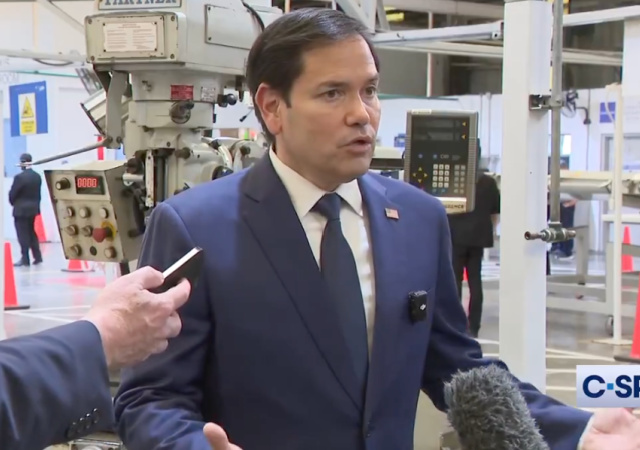UPDATE: Supreme Court Stays District Court Order That U.S. Pay $2 Billion To Foreign Aid Contractors By Midnight

In our Morning Insurrection newsletter (subscribe here), I commented this morning:
“I was reading an excellent article at JNS about how Judges in Israel have taken almost complete control of political and policy decision making through vague concepts as to what is in the public interest. Unfortunately, it reminded me of what is happening in many U.S. District Courts where vague and broad concepts under the Administrative Procedures Act have been used in an attempt to substitute the political and policy judgments of judges for those of the executive branch. In Israel and here, the result of judicial usurpation of political and policy decisions will result in a collapse of faith in the judiciary.”
A well-organized and financed effort that was planned for several months to paralyze the executive branch through lawfare has unfolded in several dozen lawsuits since the Inauguration. Unfortnately, some — but not all — district court judges have overstepped their constitutional boundaries to micromanage and second-guess policy and political decisions. There is no better example than AIDS Vaccine Advocacy Coalition v. U.S. Dept. of State, where they obtained a crazy (I don’t use that term lightly) order that DOS pay $2 billion in invoices by midnight tonight.
The Motion for Emergency Stay detailed how crazy (but I repeat myself) this Order was:
In this action under the Administrative Procedure Act, the district court has ordered the federal government to pay nearly $2 billion in taxpayer dollars within 36 hours, without regard to payment-integrity systems that would ensure that the monies claimed are properly owed, without regard to the federal government’s meritorious arguments to the contrary, and without so much as addressing the government’s sovereign-immunity defense. A stay pending appeal, and an immediate administrative stay, are necessary to prevent grave and irreparable harm to the government.To be very clear: the government is committed to paying for work that was properly completed, so long as the claims are legitimate. What the government cannot do is pay arbitrarily determined expenses on a timeline of the district court’s choosing, so that a district court creates a payment plan at odds with the President’s obligations under Article II and bedrock principles of federal sovereign immunity. And regardless whether this Court stays the district court’s order, agency leadership has determined that the ordered payments “cannot be accomplished in the time allotted by the” district court. AIDS Vaccine Dkt. No. 37-1, at 2. In light of these exigencies, we request an administrative stay by February 26, 2025, at 1:00 PM. If no administrative stay is granted, we waive our reply and request a ruling on the stay motion by 4:00 PM.Although this litigation began as a (meritless) challenge under the APA to a pause in certain federal contracts and grants, it has morphed in the last 24 hours into a sweeping effort to require massive outlays of funds under thousands of funding instruments, including many that do not involve any of the plaintiffs and are not even in the record. There are statutory schemes, administrative remedies, and an entire Article I court dedicated to resolving disputes over contractual payments for already-performed work, which precludes review under the APA. But the district court brushed aside those arguments, even though they were raised by the government in its opposition to a preliminary injunction filed last week and renewed at today’s hearing, on the ground that the government had not adequately preserved the arguments, in writing, between the filing of a motion Monday night and an emergency hearing convened at 11:00 Tuesday morning. The original order in this case, for that matter, was also issued before the overnment had ny opportunity to respond in writing to plaintiffs’ deeply flawed arguments.The district court’s order is incredibly intrusive and profoundly erroneous. It appears to contemplate the immediately outlay of nearly $2 billion. The government has no practical mechanism to recover wrongfully disbursed funds that go out the door to entities that have complained that they are near insolvency. And the district court’s broad exercise of jurisdiction, resolving monetary claims beyond its proper authority and addressing the hypothetical claims of parties not before the court, was without legal basis. The district court’s order should be stayed pending appeal.1 In addition, the order should be immediately administratively stayed
When most of the day had passed without the appeals court ruling, the Trump administration filed an emergency application, repeating many of the same arguments, with the Supreme Court.
The government cannot function—and the President cannot discharge his Article II responsibilities over foreign affairs—if a district court can appoint itself the claims-processor for the federal government and second-guess the Executive Branch’s determinations on pain of contempt proceedings.
The DC Circuit Court of Appeals finally ruled tonight, and it dismissed the emergency application and the appeal as procedurally improper, claiming the government should have appealed the earlier TRO, not the enforcement of the TRO. Of course, in the unrelated Dellinger case that also is at SCOTUS, the appeals court ruled the government could not appeal the TRO.
The court system is not handling the lawfare well at all (understatement). The Supreme Court needs to intervene here and in other cases to save the judiciary from itself.
UPDATE 10 P.M.
Chief Justice Roberts, the Justice assigned to cover the DC Circuit, has issued a stay:
UPON CONSIDERATION of the application of counsel for the applicants, IT IS ORDERED that the February 25, 2025 orders of the United States District Court for the District of Columbia, case Nos. 1:25-cv-00400 and 1:25-cv-00402, are hereby stayed pending further order of the undersigned or of the Court. It is further ordered that any response to the application be filed on or before Friday, February 28, 2025, by 12 p.m. (EST).
CLICK HERE FOR FULL VERSION OF THIS STORY